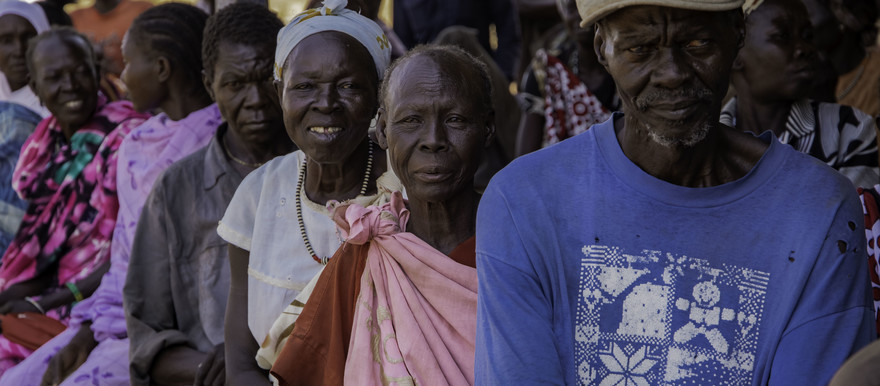Dozens of men and women gather outside what was once the Office of the Administrator in Bussere, in the Western Bahr el Ghazal region of South Sudan, before it was destroyed during a spate of armed confrontations that has ripped across much of the country.
The men and women patiently wait for their names to be called out to receive a modest cash assistance as part of the International Organization for Migration’s (IOM) Cash-for-Work programme that is supporting families who have voluntarily returned to Bussere to rebuild their lives. Many of them had fled the area due to the fighting.
One by one, they walk up to collect their money when their name is called.
Communal farm land cleared by the community under the cash-for-work project. Photo: IOM 2021/Aleon Visuals
Sam Lokore, IOM’s Transition, and Recovery Unit Livelihood Programme Assistant and a local chief, carefully verifies the IOM-issued tokens before the money is handed to each individual. Those who can read and write, sign their names. And those who cannot, dip their thumbs in the inked stamp pad and imprint their fingerprint as confirmation for receiving the money.
It is a well-organized and seamless process.
Mary John, 39, says that it has been difficult to make ends meet since she returned to Bussere after four years living in a collective centre for internally displaced persons (IDPs) in Wau town, some 15 kilometres away.
Mary John cradles her 3-month-old baby while waiting to collect her cash incentive. Photo: IOM 2021/Aleon Visuals
“I could barely recognize the village when we returned,” says Mary John, a mother of three. “Our hut had been razed to the ground and we had to start rebuilding.”
“It has been difficult to get food for the children – but we are trying,” she adds after a short pause.
Like many people receiving the cash assistance, Mary says she will use the incentives to help support her family.
“After I get [the money], I am going straight to the market to buy food and soap for my children,” she says with a little smile.
Mary John.
At the sound of her name – baby in one hand and her yellow token in another – Mary gets up to collect her cash.
Under the cash-for-work project, the community cleared communal farmland and removed weeds and tree stumps. They also ploughed and dug ridges where the drippers used for irrigation will be placed at the start of the planting season.
The rehabilitated farmland will be used by the community to plant vegetables. This will help make food available for families, and also generate income from the produce sold.
A man makes an inked thumb impression after receiving the cash incentive. Photo: IOM 2021/Aleon Visuals
“We worked closely with the community to identify a total of 200 men and women, including young adults from the most vulnerable families, divided into two cohorts for the cash-for-work project,” says IOM’s Sam Lokore.
The community used their own tools, some borrowed from neighbours, to complete the work.
Community structures were also established to help resolve disputes that may arise among those benefiting from the cash-for-work initiative, as well as the wider community, to avoid tensions and strengthen social cohesion, creating a sense of unity within the community.
Fifty-five-year-old Emilio Dolba, who until recently had been living in Hai Masna Collective Centre in Wau, says it was good to see both men and women working the fields together.
Emilio Dolba receives cash assistance. Photo: IOM 2021/Aleon Visuals
“We pushed together to help ourselves. Everyone had a role to play. Digging, pulling, carrying… we worked as one,” says Emilio Dolba.
“And when the greens start to sprout, we will know it was a community effort,” says Emilio.
IOM’s Transition and Recovery Unit’s Livelihood Programme is funded by the UK Government’s Foreign, Commonwealth and Development Office (FCDO).
This article was written by Liatile Putsoa, IOM South Sudan Media and Communications Officer.




